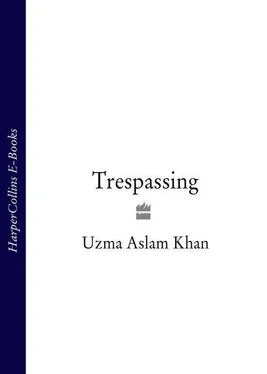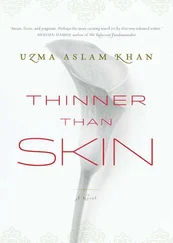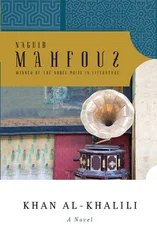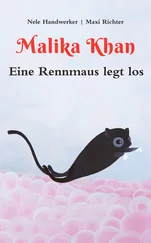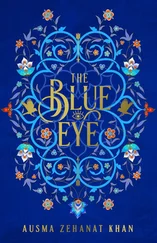It had been three days since they’d last met, at the Quran Khwani, and two since their telephone conversation. Dia didn’t know how to start on the topic of the boy.
‘What did you do yesterday?’ attempted Nini.
‘I went to the farm. Then I read. Alone and to Inam Gul.’
‘How’s it going, your studying for the retake?’
‘It’s going nowhere. The books are so stupid.’
‘I’m sorry,’ Nini muttered.
Nini, as always, had passed all the tests. She’d always been a gifted student. She did what she had to do — memorize and spew like a parrot — keeping her independent views on what she spat to herself. Nor was she, unlike Dia, at all bothered by the cheating that went on during the exams. She’d shrug and say, ‘God watches us. That should be enough.’ In her English accent it sounded funny: God wolches es.
They’d been friends since the day a teacher brought the terrified child to Dia’s class. Nini chewed her nails when asked to read out loud because her accent provoked giggles. Dia soon learned that Nini had been taught none of the customs her family, recently migrated from England, suddenly demanded she uphold. Nor could Dia, who wasn’t expected to do the same, help. Alone, Nini determined to learn what was desired of her. She visited relatives regularly; picked up key Urdu phrases and used them on cue; learned to cook; excelled in school; groomed immaculately; behaved with modesty. She embodied two conflicting worldviews, modern and traditional. Like the fabled Hansel (or had it really been Gretel?), the young Nini had the presence of mind to mark her way back to a home she’d never been encouraged to know.
And now she wanted to leave it.
And leave it the traditional way.
She’d never bring shame to her family. They’d made what they set out to make.
Dia looked at her. ‘Explain it again. I’ve tried, but just don’t understand.’
‘You don’t want to, that’s the problem.’ Nini spun around. ‘You have fixed notions. Mind blocks. You think you know my future?’
Dia croaked, ‘I’ve never known what’s going to happen. If you don’t know that, you haven’t known me.’ She took a deep breath. ‘What if marrying this stranger makes your life worse? Then where will you be?’
‘Don’t be such a pessimist. What if it gets better?’
‘But that’s a gamble. Think of all the women who’ve gambled and lost.’ She began to recite their names. She was on the ninth — Sana, who’d married an engineer in America, and left her home and family only to find the groom had another wife, and two children besides — when Nini cut her off with a laugh. It was a hard, world-weary laugh. Dia wondered who the greater cynic really was.
She had her answer when Nini said, ‘You and I know nothing about freedom, Dia. Look at us. Always stuck behind walls and in cars. If we step out, what is there? If it’s not physical danger, it’s gossip. Did you see Tasleem’s daughter Nissrine, romping around so boldly on her own? How many times have I been warned never to provoke that? My parents’ image is my headache. You call that freedom? Come on!’
‘My point,’ Dia insisted, ‘is that you’ll have the same headache plus many others.’
‘You haven’t mentioned the ones whose marriages work,’ countered Nini. ‘Some women have more flexibility around their husbands than their fathers. Look at your mother. She blossomed after marrying a man she didn’t know and has been an inspiration to so many other women. Karachi’s becoming a city of entrepreneurial mothers. They get what they want. They just have to give in first. It’s simple mechanics.’
Dia turned away. Yes, her mother had thrived, and yet her warning echoed in the grove. Marry out of love. Not obligation. Dia pictured her parents sauntering between the trees. Strangers, not friends. ‘If that’s as good as you think it can get, it’ll never get any better. We’re more than simple mechanics. It’s okay to aim higher, or have dreams.’
‘And where do dreams get us?’ Nini shook her head. ‘I worry about you. If you’re not careful you’ll end up lonely, like …’
‘Oh please,’ Dia cut her off. ‘Like Ama? She used to be our role model, remember?’ How conveniently Nini used Riffat when it suited her and condemned Riffat when it didn’t. That was just how the public treated her mother — as a useful name to drop. Nini was as two-faced as the rest of them.
They sat in silence on the ground, facing a bed of periwinkles. Behind the flowers rose the school wall, its top a heap of glass shards. Nini took Dia’s hand. ‘You know I love your mother.’
Dia looked at her tennis shoes, then Nini’s. Several months ago, on a whim, they’d sat exactly like this in her garden, under the mulberry tree, feet together, shalwars pulled up high above the knees, and spray-painted the shoes. With eyes clamped shut, they pressed and heard the colors wheeze out. Laughing, they agreed not to open their eyes till the job was done. Dia felt the cold chemicals settling around the canvas on her feet. She favored circles while Nini went for zigzags. Now, feet together, Dia saw how the pattern still fit exactly. Every purple swerve begun on one foot ended on the other. A golden slant rising on Nini’s right small toe descended on Dia’s left small toe.
Dia inhaled deeply. ‘What makes you so eager now? When you got proposals before you weren’t keen.’
‘Why now?’ Nini repeated and shrugged. ‘Time.’
‘Time?’
‘There are things that simply happen when they should.’ Her tendril-like fingers clasped Dia’s shorter ones. ‘I felt it when we left England. It was time for it, somehow. And now it’s time for another move. There are moments when you ought to let yourself be carried away.’
Dia snorted. ‘You sound fifty. Next time let’s spray-paint our hair. I’ll do yours white, and you can do mine, I don’t know,’ she threw up her hands. ‘Orange!’
Nini let go Dia’s hand. ‘I’m doing my best to be sympathetic. You aren’t trying at all.’
‘You’re barely twenty, Nini!’ Dia said aghast. ‘You’ve got loads of time.’
Nini glowered. ‘After the disaster at the Quran Khwani, his mother’s probably changed her mind. In case she hasn’t — God knows I would — we’re only talking about an engagement now. The marriage will come after his graduation, when he’s got a job.’
Should she bother to ask the obvious? Why not? ‘Since he’s going to be the breadwinner, shouldn’t you be sure he has a job? And a pretty good one?’
‘His father was a great doctor. The son’s likely to follow in his footsteps,’ Nini replied adamantly.
‘Do you even know what he’s studying?’
‘Well,’ she twirled her hair. ‘He’s supposed to be very bright. After all, he got a scholarship to study in America. I’m sure he’ll be hugely successful.’ She gazed absently at the wall, as though it were a crystal ball.
Dia felt vaguely nauseated. ‘So the answer is you don’t know?’
Nini glowered again.
‘Talk about dreaming,’ Dia hissed.
A bell rang. It came from the direction of the college. The first period had ended. ‘I suppose we ought to go,’ said Dia.
But neither moved.
At last Nini stood up. ‘Since your twenty questions are up, I suppose we should.’
‘Eighteen,’ countered Dia, still sitting.
‘What now?’
‘If his mother rescinds, or if for some other reason the engagement doesn’t materialize, and if you feel it’s time, does that mean you’ll simply agree to the next proposal?’
‘I wondered why you hadn’t asked that one yet. The answer is: if it’s as good as this one, yes.’
Читать дальше
Конец ознакомительного отрывка
Купить книгу
